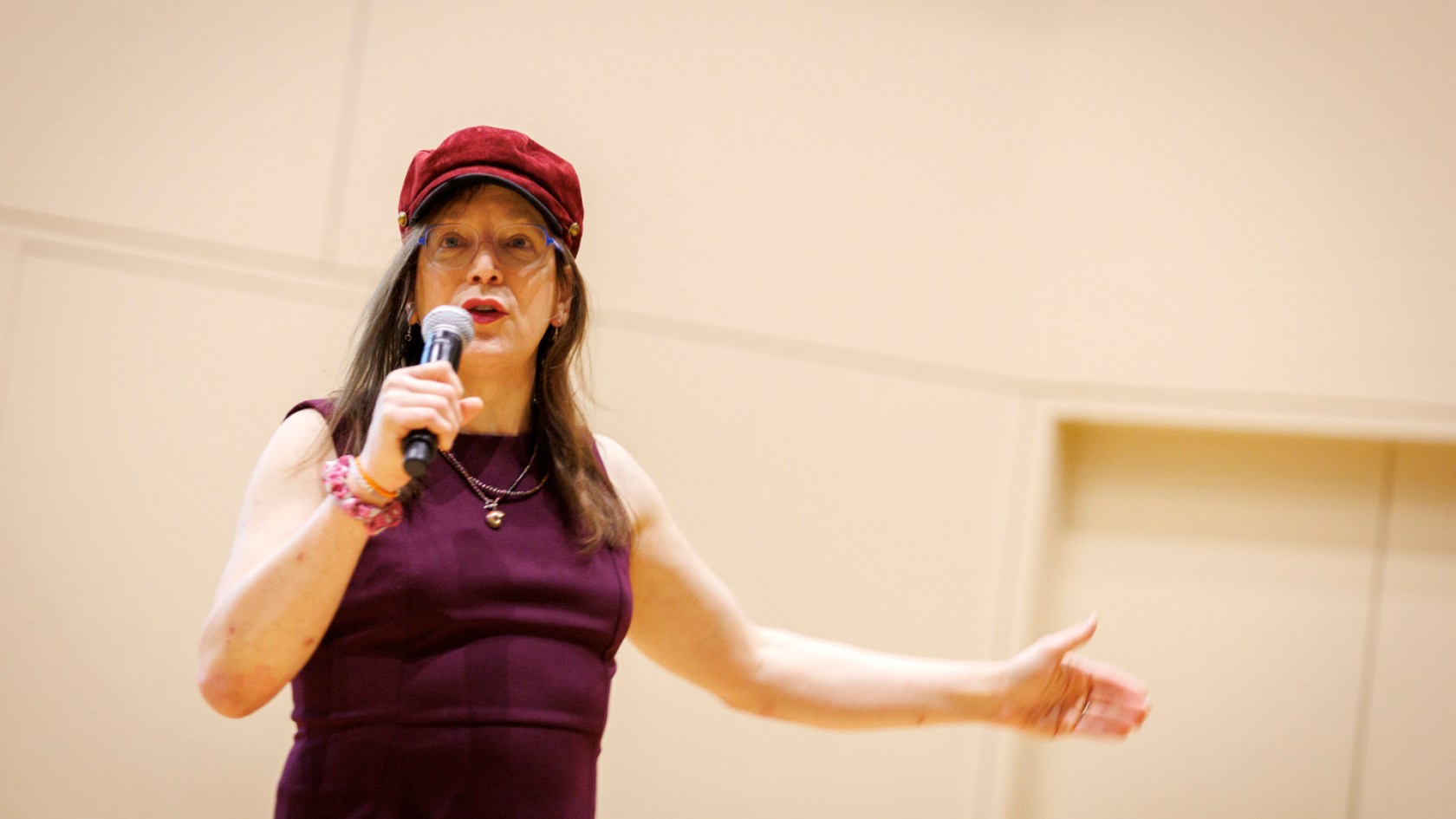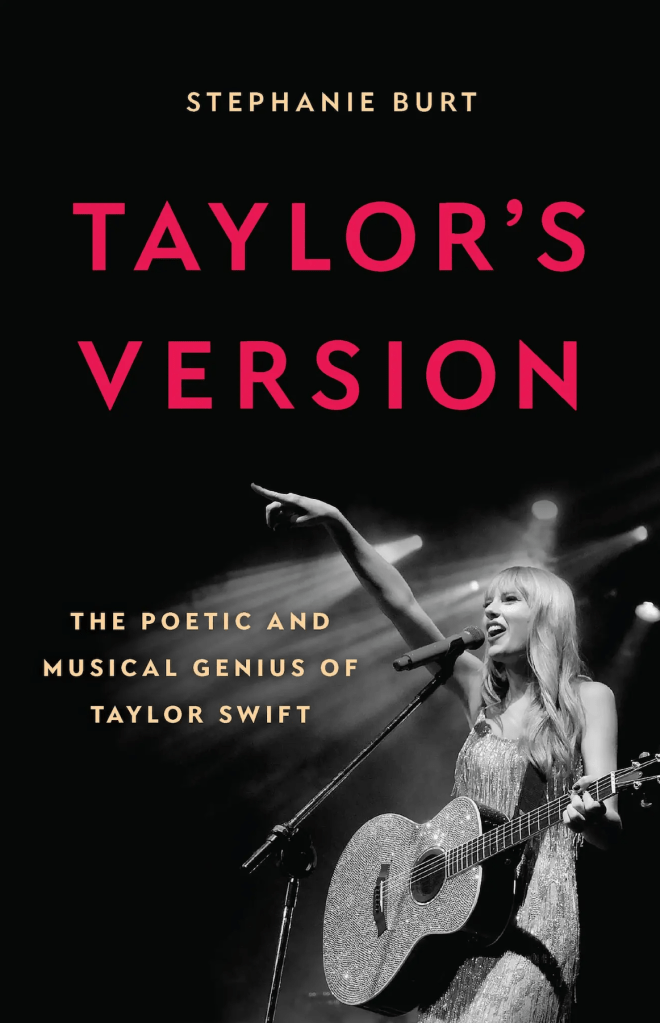When your English teacher writes a book on Taylor Swift
When your English teacher writes a book on Taylor Swift
Professor Stephanie Burt examines star’s influence, work ethic, why her music matters

When Stephanie Burt decided to carry a pink and blue Taylor Swift tote bag to class one day in fall 2023, she just thought it would be a fun way to transport her books and laptop, and let her students know she was a Swiftie.

The Donald P. and Katherine B. Loker Professor of English had no idea that just one semester later she would be teaching a Taylor Swift lecture course to 200 undergraduates that would attract nationwide media attention and even a feature on the “Today” show. And that two years later, she would be releasing book on the star’s work.
“No part of this journey was anything I expected,” said Burt, who realized there was interest in a Swift course after some students spotted her bag and asked her to supervise their independent research work on the pop singer. “I figured I would have a Taylor Swift seminar, and there would be eight or 10 or 15 Swifties, and we’d have a big wooden table, and we would talk about how her songs worked and study them in conjunction with relevant poems and novels and other pieces of writing. Then 200 people showed up.”
In her new book, “Taylor’s Version: The Poetic and Musical Genius of Taylor Swift,” Burt draws on both her teachings and her experience as both literary critic and pop music enthusiast to examine the singer-songwriter’s body of work, and the community of fans it inspires.
In this edited conversation with the Gazette, Burt shares her thoughts on Swift’s influence as a songwriter who remains both aspirational and relatable, and defined by an intense work ethic.
Did teaching the Taylor Swift course give you any new perspectives, either about Swift or about teaching?
I got to know her work better, especially the parts of her work that were not already my favorites.
I got to know the first album much better than I would have otherwise — you can really hear her becoming herself in real time as you go from one song to the next.
“I got to know the first album much better than I would have otherwise — you can really hear her becoming herself in real time as you go from one song to the next. “
And I got to know her album “Reputation,” which is probably still her most controversial album, where she makes the most visible break from what she had been trying to do before.
I also learned a lot about the ups and downs and the entertainment value and the limits of teaching a very large humanities course.
I don’t know that I’m going to try to teach a course of that size again. I certainly expect the Taylor class to run every few years for as long as there’s student interest, but I may make it a seminar next time.
In your book, you suggest that Swift’s success is due, in part, to singing songs she wrote herself. Why is that important?
If you go back far enough in the history of Western song forms, there’s no reason why the vocal interpreter of the song needs to be the person who wrote the song.
But after the rise of the Beatles and Bob Dylan in the mid-’60s, you get a strong expectation in parts of popular music — and an openness to it in others — that the songwriter be the singer. The openness provides an opportunity for Taylor when she’s in her teens starting out and sees herself principally as a songwriter.
One of the reasons why she walked away from her first chance at a major label contract in Nashville was that if she had gone with that contract, she would have been required to sing songs she didn’t write.
I think it’s largely accurate to see all of the things that Taylor has learned to do as being in the service of getting the songs that she writes. She learns to be a dancer; she learns co-organize a stage company as someone who’s very hands-on about her own touring; she gets to be a better and more consistent singer; she learns to put a tremendous amount of energy into fan relations and other kinds of marketing.
She demonstrates all of these skills, without which she would not have become the economic titan that she is.
What do you mean when you write that Swift is both aspirational and relatable?
She’s able to write many different songs that allow a sympathetic listener at once to say, “I have a lot in common with her, she really gets me,” and “I like to imagine being her, I wish I was more like her.”
The fact that she can do both of those things, not only in the same career but in the same song, and that she does them so often and with such formal variety, that’s really the core of why she’s so good.
“The fact that she can do both of those things, not only in the same career but in the same song, and that she does them so often and with such formal variety, that’s really the core of why she’s so good.”
Look at the title track from “Red.” On the one hand, it would be great to be able to imagine the thrill of being in a Maserati going many miles an hour — you’re in this sleek machine; life is going by; and everything is excitement.
On the other hand, many of us have had the experience of falling for someone and feeling like things are happening so fast that it’s scary. The sense, from “Red,” is that she’s been there too. She is able to write words and music that are both attractive and exciting to think about and also reach out to who we’ve already been.
You also write, importantly, about Swift’s work ethic.
She does a lot of work to get and stay popular: interviews, going on TV, doing appearances, touring. Within the songs, she writes about how she can’t stop working. She can’t slow down.
The song ”Mastermind” is probably the best example of that. She is always afraid things will be taken away from her, and she’s always trying to get to the next thing and sort of outrun her brain weasels.
I think a lot of us see that aspect in our own lives, especially people at Harvard. If you never stop working and you never slow down, you’ll never have to confront your self-doubt. That’s honestly one of the reasons that I personally have gradually become such a big Swiftie — there’s a lot I want to do. If I slow down and stop, maybe I won’t be worth anything, and maybe it will all just go away, so I have to never stop working.
Fortunately, I like working. It’s not terribly healthy, but it’s very American, and it’s one of the things Taylor sings about.
Has writing and teaching Swift changed the way that you listen to her music now?
One of the ways that I know that I’ve made a good choice when I decide to write about something is that when you make a good choice you’re more into it at the end than at the start.
I was at a karaoke event last week, and I sang “I Can Do it With a Broken Heart.” It is a song that requires you to breathe in challenging, counterintuitive ways.
Taylor tells you at the beginning of the second verse, “I can hold my breath / I’ve been doin’ it since he left.” It’s one more case of playful self-referentiality.
I learned even more about the song, which I had already written about at length. With my favorite Taylor works, there’s just always more there.
Latest Harvard
- Researchers report ‘astounding’ obesity surge in U.S.Prevalence rises to 70 percent under definition that includes measures other than just BMI
- Putin doesn’t care what we thinkJournalists Baker and Glasser explore how Russian leader has interpreted, defied ambitions of U.S. leaders
- How sexism in medicine continues to endanger women’s healthRadcliffe symposium explores persistent bias in care today, from marginalizing heart disease symptoms to over-diagnosing anxiety
- Want Americans to love EVs? Fix this.U.S. consumers aren’t thinking about daily needs when buying a car, says former GM chief economist
- ‘Dry January’ helped drive drinking rates to 96-year lowHealth experts say rise of sober-curious movement, shifts in tech, meds likely made difference in wake of pandemic excess
- Time for mandatory retirement ages for lawmakers, judges, presidents?Americans seem to mostly say yes; legal, medical scholars point to complexities of setting limits






